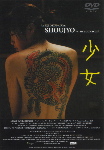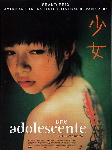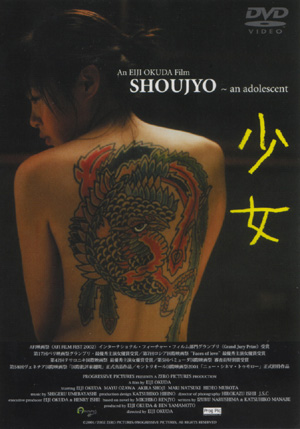| Shoujyo – An Adolescent |
|
This is one of those films, that most reviewers probably just want to give a short review - or none at all.
Why is that? Is it a bad film? No. Is it a masterpiece? No. Is it another of those Japanese films, where exaggeration helps understanding? Not really. It's because it starts a lot of people (if they are male) thinking about some quite unpleasant facts of the male psyche and sexuality, that most of us do not really want to talk about out loud. The subject of the movie is a May/December romance of the more extreme kind – he is 43 and she is just 15. The film is not exploitative as such, but what is it then: Wishful thinking of a middle aged man? The well-known Japanese Lolita complex? A warning? A true love story? I’ll have go get back to that. Let’s start with the story: Tomokawa (Eiji Okuda) is a 43 year old policeman in a small town. He is not corrupt as such, but has a little scam going: He picks up dogs belonging to young, lonely housewives. After keeping the dogs for some time, he gives them back to their owners, who are very grateful – so grateful in fact, that they have sex with him. Sukemasa (Shoji Akira) is a young man, who is slightly retarded. Tomokawa has taken a liking to him, and they have become friends. One day Tomokawa sits half asleep in a bar, when Yoko (Mayu Ozawa) walks in, starts talking to him – and then offer him sex for money. They go to a hotel room, but Tomokawa falls asleep, and when he awakes, Yoko is gone. He becomes obsessed with finding her, and finally succeeds. It turns out, that she is Sukemasa’s sister, and they are both living with their grandfather, who tattooed a big male bird with only one wing on Tomokawa’s back, when he was young. Yoko and Tomokawa become lovers in spite of the vast age difference, and Yoko’s grandfather wants to tattoo her back as well. She is repulsed by the thought of having her beautiful skin scarred forever with such a large tattoo, but at the same time she dreams about getting a one winged female bird tattoo to complement that of Tomokawa’s – and enabling the two lovers to fly away together. The mother of Yoko and Sukemasa plays an important part, which you will learn, but the big question is, if the love of Yoko and Tomokawa will endure in spite of the huge age difference and the taboo of such a union in Japanese society. That’s the story. Eiji Okuda is also the Director. He has starred in more than 25 Japanese films, but this is his debut as Director. The film was a hit on the festival circuit. It won the Grand Prix at the Paris Film Festival and the Grand Jury prize at the AFI festival in Los Angeles. Mayu Ozawa won the Best Actress prize at the Paris Film Festival and The Saloniki Film Festival. Courageous but deserved awards. In Japan it was not a big success – maybe the subject was too controversial even for the Japanese. I’ve said, that the film is not exploitative as such. We don’t get pornographic sex or long drawn out simulated intercourse scenes. Thank you. The closest we get to pornography is the hotel room scene, where Yoko and Tomokawa have just met. They are both fully clothed, but Tomokawa writing the symbol for “eyebrows” is very erotic and explicit anyway. We do get nudity, but it’s quite aesthetic (and also quite erotic) and enhances the love story as it is supposed to. Is the film the wishful thinking of a middle aged man, then? With a subject like this, there will always be a heavy element of that – no matter what you claim the film is about. In Japanese culture the Lolita complex is more widespread (or at least acknowledged), than in most western societies. The biological urge of the old bull to confirm his sexuality, by his continued ability to attract young females, is hardwired into the males of most species. Whether the human male decides to act upon it or not – that is a different matter. In the big cities of Japan a rising number of young high school girls prostitute themselves with middle aged men to get money to buy the expensive brands of clothes, cell phones etc., that are otherwise unaffordable for most young girls. This problem is mentioned in the film, but is not really touched or warned about. In an interview Eiji Okuda did say, that he detests that practice. But this film is not about prostitution. Of the elements mentioned at the beginning of this review, we only have the true love story left. And that’s what this film is. A love story. There are certain elements of the other possibilities mentioned, but the love story, is what this film is about. Is true love possible in a situation like this? I suppose – but not lasting love. It is bound to end badly. The Director thinks so himself, which he reveals with the last sound in the last frame of the film before the end credits. Yoko has had a tough childhood, with an extremely self centered mother and a sexually abusive stepfather. She tells Tomokawa, that being with him is the first time in her life, that she has loved life. But no matter what her experiences – a 15 year old girl is still a girl and not an adult. She is the one, who is going to get hurt. Tomokawa (and the Director) does not seem to worry about this. The only time Tomokawa tries to deny his love for Yoko and leave her, is when he is afraid that staying with her will kill her brother! The film is slow at times, but it does tell it’s story in a gripping way. Had it been just another exploitation flick, I would not have written this long review (and attempted analysis) – I wouldn’t have reviewed it at all. The romantic side of me wanted this love affair to be both possible and lasting. The analytical part of me knows, that this is extremely unlikely – and that is the way it very much should be. I would like to know, however, how a woman sees this film: Disgusting, exploitative, impossible love story or……? The fact is, I liked this film – and I’m not sure, I like this fact. |
|
Uffe Stegmann
July 26, 2004 |













